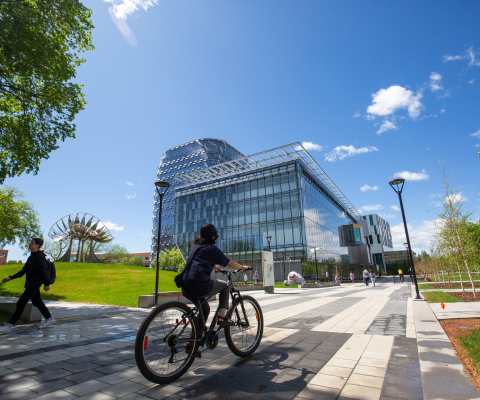Innovation isn’t a magic bullet, it requires a work plan

This oped was published in the Vancouver Sun on October 26, 2017
By Andrew Petter, president of Simon Fraser University
It’s always tempting, when you’re wrestling with a problem, to seek a single solution — like a software patch that will update your phone or restore your computer. Yet, the global economy is no simple organism. And innovation is no magic patch. Rather, it’s a process of discovery, invention, engagement and application that demands multiple solutions to achieve optimal results.
I raise the matter as a caution — and encouragement — in anticipation of two conferences coming to Vancouver next week. The first is Innovate Now Canada, a forum hosted by CityAge and The Rideau Hall Foundation to explore what Canada needs to do to create a culture of innovation. The second is Scaling Up for Prosperity in a Changing World, a Business Council of B.C. summit that will examine strategies for diversifying our economy and scaling up businesses.
Both offer impressive programs, and both will bring lots of smart people together. But no conference-goer should expect a single, elegant answer to the innovation challenge, no matter how passionate participants are about their favourite prescription.
Some may argue we need big investments in digital infrastructure (and we do). Others may suggest that we should create more innovation clusters (and we should). Still others may say that Ottawa should increase its investments in university research (and you will get no disagreement from me on that).
But while all of these solutions are necessary, none is sufficient. Digital infrastructure requires innovative content. Industrial clusters need capital investment. And every successful innovation strategy depends upon a growing talent pool (which is a challenge in B.C. due to our lack of investment in post-secondary education).
As to university research, there is continuing debate about the relative contribution of such research to an innovation economy. The recent federal Fundamental Science Review led by former University of Toronto president David Naylor concluded that Canada’s innovative capacity is diminished by the fact that we are losing ground to other countries in research competitiveness. The solution, Naylor recommends, is to increase federal support for basic research, with its potential to produce truly transformative breakthroughs.
At the same time, skeptics point out that Canada has fallen short in harnessing and mobilizing the results of basic research for social and economic benefit.
Both sides advance reasonable arguments. And, in doing so, they confirm the need to avoid looking for single answers to our innovation challenge. The Naylor report is undoubtedly right in arguing that increased investments in basic research are essential to boosting Canada’s innovative capacity. But the skeptics also have a point in saying that more needs to be done to increase the societal impact of such research.
The good news is that Canadian universities are responding to the need to develop mechanisms to maximize the social and economic value of federally funded research activities. Simon Fraser University, for example, has implemented SFU Innovates, a component of our ‘engaged university’ strategy that connects students and researchers with industry and community partners to develop and mobilize innovations.
Our 4D Labs is a state-of-the-art materials science and engineering facility that undertakes research in collaboration with industry, even as it assists SFU researchers to find and develop market applications for their discoveries and inventions.
Innovation Boulevard, a partnership between SFU and the City of Surrey, embeds university researchers in the community where they work alongside professionals, businesses, public agencies and entrepreneurs to develop new health technologies and solutions.
SFU Innovates also supports business incubators and accelerators, including SFU Venture Labs, which is linked to accelerators in Ontario, India and China, and leads the province in capital formation, job creation and revenue growth.
We are advancing social innovation through a program called RADIUS (RADical Ideas Useful to Society), and supporting innovation in Indigenous communities through our RBC First Peoples Enterprise Accelerator.
SFU Innovates is testament to one university’s commitment to support innovation by developing an interrelated set of mechanisms to help students and researchers leverage the social and economic value of their ideas, discoveries and inventions.
It also provides further evidence as to why addressing Canada’s innovation challenge isn’t about finding single solutions, but about developing multiple solutions that work together.
-30-
About Universities Canada
Universities Canada is the voice of Canada’s universities at home and abroad, advancing higher education, research and innovation for the benefit of all Canadians.
Media contact:
Lisa Wallace
Assistant Director, Communications
Universities Canada
[email protected]
Tagged: Research and innovation
Related news
-

Urgent action for our publicly-funded universities critical to Canada’s economic stability and growth
-

Outstanding discoveries by Black researchers in Canada
-

Universities are advancing technology through international partnerships
-

Global university partnerships are finding solutions to the climate crisis
